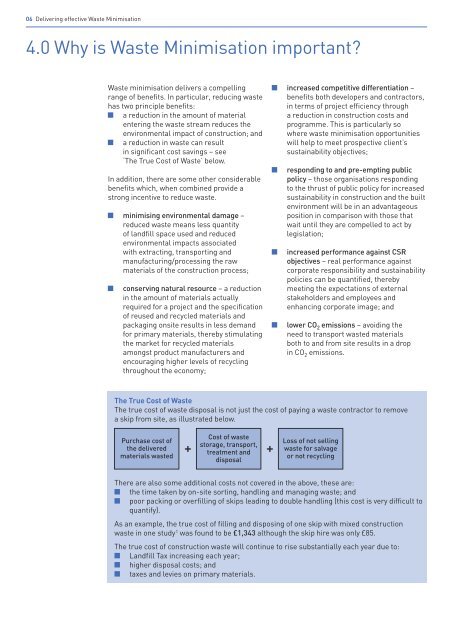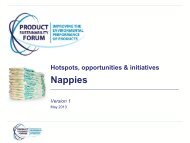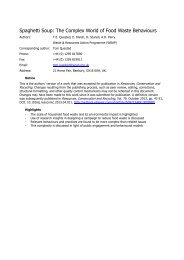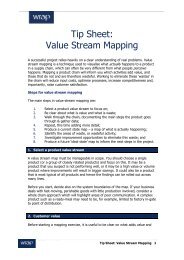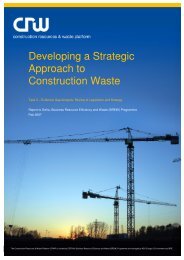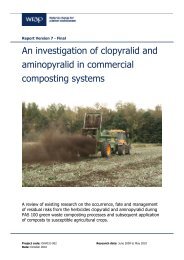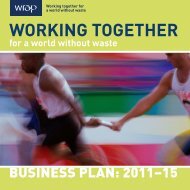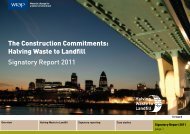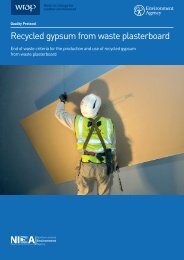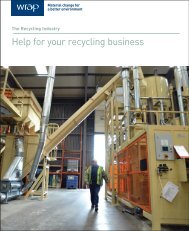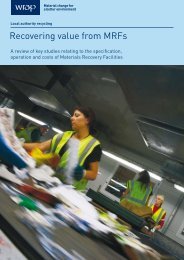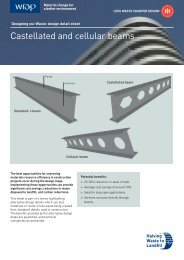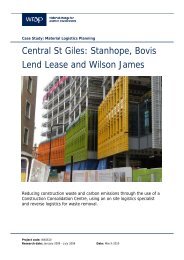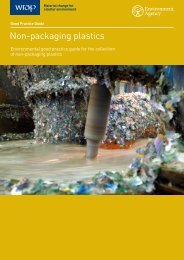Delivering effective Waste Minimisation - Wrap
Delivering effective Waste Minimisation - Wrap
Delivering effective Waste Minimisation - Wrap
Create successful ePaper yourself
Turn your PDF publications into a flip-book with our unique Google optimized e-Paper software.
06 <strong>Delivering</strong> <strong>effective</strong> <strong>Waste</strong> <strong>Minimisation</strong><br />
4.0 Why is <strong>Waste</strong> <strong>Minimisation</strong> important<br />
<strong>Waste</strong> minimisation delivers a compelling<br />
range of benefits. In particular, reducing waste<br />
has two principle benefits:<br />
a reduction in the amount of material<br />
entering the waste stream reduces the<br />
environmental impact of construction; and<br />
a reduction in waste can result<br />
in significant cost savings – see<br />
‘The True Cost of <strong>Waste</strong>’ below.<br />
In addition, there are some other considerable<br />
benefits which, when combined provide a<br />
strong incentive to reduce waste.<br />
minimising environmental damage –<br />
reduced waste means less quantity<br />
of landfill space used and reduced<br />
environmental impacts associated<br />
with extracting, transporting and<br />
manufacturing/processing the raw<br />
materials of the construction process;<br />
conserving natural resource – a reduction<br />
in the amount of materials actually<br />
required for a project and the specification<br />
of reused and recycled materials and<br />
packaging onsite results in less demand<br />
for primary materials, thereby stimulating<br />
the market for recycled materials<br />
amongst product manufacturers and<br />
encouraging higher levels of recycling<br />
throughout the economy;<br />
increased competitive differentiation –<br />
benefits both developers and contractors,<br />
in terms of project efficiency through<br />
a reduction in construction costs and<br />
programme. This is particularly so<br />
where waste minimisation opportunities<br />
will help to meet prospective client’s<br />
sustainability objectives;<br />
responding to and pre-empting public<br />
policy – those organisations responding<br />
to the thrust of public policy for increased<br />
sustainability in construction and the built<br />
environment will be in an advantageous<br />
position in comparison with those that<br />
wait until they are compelled to act by<br />
legislation;<br />
increased performance against CSR<br />
objectives – real performance against<br />
corporate responsibility and sustainability<br />
policies can be quantified, thereby<br />
meeting the expectations of external<br />
stakeholders and employees and<br />
enhancing corporate image; and<br />
lower CO 2 emissions – avoiding the<br />
need to transport wasted materials<br />
both to and from site results in a drop<br />
in CO 2 emissions.<br />
The True Cost of <strong>Waste</strong><br />
The true cost of waste disposal is not just the cost of paying a waste contractor to remove<br />
a skip from site, as illustrated below.<br />
Purchase cost of<br />
the delivered<br />
materials wasted<br />
Cost of waste<br />
storage, transport,<br />
treatment and<br />
disposal<br />
+ +<br />
Loss of not selling<br />
waste for salvage<br />
or not recycling<br />
There are also some additional costs not covered in the above, these are:<br />
■ the time taken by on-site sorting, handling and managing waste; and<br />
■ poor packing or overfilling of skips leading to double handling (this cost is very difficult to<br />
quantify).<br />
As an example, the true cost of filling and disposing of one skip with mixed construction<br />
waste in one study 1 was found to be £1,343 although the skip hire was only £85.<br />
The true cost of construction waste will continue to rise substantially each year due to:<br />
■ Landfill Tax increasing each year;<br />
■ higher disposal costs; and<br />
■ taxes and levies on primary materials.


